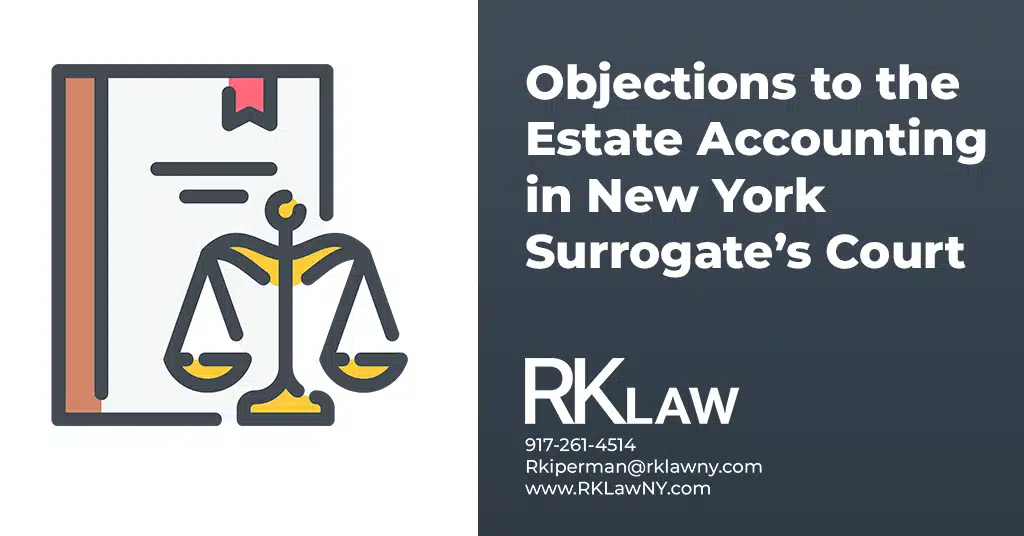When it comes to the administration of an estate, ensuring that assets are distributed correctly and fairly is paramount. However, there are situations where beneficiaries or interested parties may have valid concerns about the accuracy or fairness of the estate accounting. In such cases, after reviewing the accounting, you can file objections to the estate accounting in New York Surrogate’s Court.
Conduct SCPA 2211 Examinations BEFORE Filing Objections to the Estate Accounting
Before filing objections to the estate accounting, you should first review the accounting presented to you. Typically you will receive either: the accounting with a receipt and release OR a Citation and a Summary Statement.
You would receive a Citation and Summary Statement if there is a pending petition for judicial settlement of account and you are a necessary party. You will receive a copy of the accounting and a receipt and release if the accounting is being settled voluntarily.
If you receive a Citation and Summary Statement, you should request a copy of the entire estate accounting. Just call or write to the lawyer who sent you the papers and ask for the complete accounting. This document should provide detailed information about the estate’s assets, liabilities, income, expenses, and distributions.
What Happens After You Conduct Your SCPA 2211 Examinations?
On the return date of Citation, ask for SCPA 2211 examinations. After you have conducted your SCPA 2211 examinations and have gathered all of the information, you should see if there are any potential grounds for objection to the estate accounting. Potential grounds for filing objections, which may include:
- Inaccurate Accounting: If you suspect errors, omissions, or discrepancies in the estate accounting, you have the right to object.
- Mismanagement of Assets: If you believe that the executor or administrator of the estate has mismanaged assets, you can file objections based on this concern.
- Improper Expenses: If you suspect that the estate’s expenses are unreasonable, unauthorized, or unrelated to the estate’s administration, it’s a valid ground for objection.
- Unequal Distribution: If you believe that the assets are not being distributed in accordance with the decedent’s will or New York’s laws of intestacy, you can raise objections.
Prepare Your Objections to the Estate Accounting
Your Objections must be VERIFIED Objections. You have to sign a verification page.If you are objecting to an estate accounting, your objections should be to specific entries and specific schedules. Ensure that your objections are clear, concise, and supported by evidence. Common objections could include:
- Disputes regarding asset valuations.
- Allegations of improper expenses.
- Challenges to the distribution of assets.
Sometimes an objection to an accounting can occur when you are trying to prove kinship. When you are trying to prove that you are related to the Decedent, your only objection can be that you are listed as an “alleged” heir, rather than an actual distributee.
File the Objections to the Estate Accounting and Pay the Fee
Take the prepared objections to the Surrogate’s Court in the county where the estate is being administered. File your objections with the court clerk and pay the applicable filing fee. The filing fee for verified objections os $75.
Serve your Objections to the Estate Accounting to Interested Parties
Notify all interested parties, including the executor or administrator of the estate and beneficiaries, about your objections. Follow the appropriate legal procedures for serving notice.
What Happens AFTER Objections are Filed?
The Surrogate’s Court will schedule a conference to evaluate your objections. You are also entitled to the full gamut of discovery authorized under CPLR Article 31. You will need to obtain additional evidence by way of Document demands, Subpoenas, Depositions, and Interrogatories.
If you believe that you are right on the law, you can also file a motion for summary judgment.
The Court may set a discovery schedule to follow and hold periodic conferences to discuss status and whether any resolutions are possible.
Can you Settle Your Objections to the Estate Accounting?
Litigating objections to the estate accounting can be a very lengthy and time consuming process. You may wind up spending more money litigating than the share that you will receive. If at all possible, consider mitigating your losses and identifying whether there are any ways to settle the case.
While it’s not mandatory, it’s highly recommended to consult with an attorney specializing in estate litigation. We are here to help.
For more information, please contact NYC Probate Litigation, Guardianship, NYC Probate and Estate Planning attorney Regina Kiperman:
Phone: 917-261-4514
Fax: 929-556-2089
Email: rkiperman@rklawny.com
Or visit her at:
40 Wall Street
Suite 2508
New York, NY 10005
Visit Regina on LinkedIn
Visit Regina on Facebook
This page is made available by the lawyer for educational purposes only as well as to give you general information and a general understanding of the law, not to provide specific legal advice. By using this site you understand that there is no attorney client relationship between you and the lawyer. The post should not be used as a substitute for competent legal advice from a licensed professional attorney in your state. ATTORNEY ADVERTISING.
